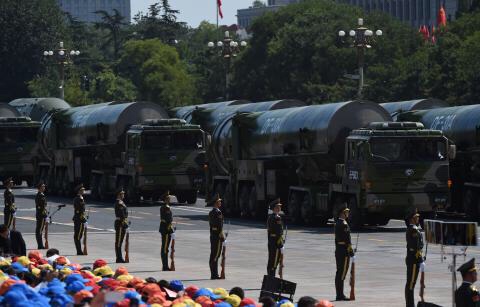 China Wants New Nuclear Weapons to Keep Up With U.S. and Russia Military Power
China Wants New Nuclear Weapons to Keep Up With U.S. and Russia Military PowerBy Tom O'Connor On 1/30/18 at 4:19 PM
The Chinese military has expressed its desire to enhance its nuclear weapons to keep up with the U.S. and Russia, two leading powers that have increasingly committed to modernizing their own arsenals.
In a commentary featured Tuesday in the PLA Daily, the official newspaper of the People's Liberation Army, military experts Li Xianrong and Yang Min detailed the nuclear strategies of the U.S. and Russia, China's primary global defense competitors. While the outlet compared nuclear weapons to a "sword of Damocles" hanging over the head of mankind and called for them to be completely eradicated in a concluding note, the editor ultimately said they were a necessary tool to secure China and forward its interests as a major international player.
"In the roiling unpredictability of today’s world, to upgrade the capability of our country’s deterrence strategy, to support our great power position... we must strengthen the reliability and trustworthiness of our nuclear deterrence and nuclear counterstrike capabilities," the editor wrote, as translated by Reuters.
The article mostly centered on the evolution of the U.S. and Russia's nuclear strategies since the Cold War and came in response to President Donald Trump's upcoming Nuclear Posture Review expected to be released by the Pentagon sometime next month. A draft version of the document was leaked by The Huffington Post earlier this month and its contents revealed controversial plans to loosen restrictions on the use of nuclear weapons and install low-yield, tactical nuclear devices on submarine-launched Trident II D5 ballistic missiles.
Li and Yang, both researchers at the ruling Chinese Communist Party-controlled PLA Academy of Military Science, claimed that the Trump administration's plan, if realized, would make the U.S. a more powerful nuclear power than ever before. They noted that the U.S. draft suggested committing up to $1.2 trillion for three decades of upgrades to the Pentagon's nuclear triad, including B-21 Raider strategic bombers in the air, Columbia-class nuclear submarines at sea and various nuclear missiles and bombs deployed at air, land and sea.
The Chinese researchers wrote that Russia too was revolutionizing its nuclear force. They referenced Russian President Vladimir Putin's ongoing push to modernize 90 percent of his country's nuclear force, the largest in the world, by 2021. Tuesday's analysis mentioned critical improvements to Russia's Topol intercontinental ballistic missile (ICBM) and the highly-anticipated R2-28 Sarmat, or "Satan 2," ICBM among other developments.
The U.S. and Russia's latest nuclear initiatives, coupled with heightened tensions between the longtime foes, have raised concerns about their ability to maintain peace, especially as they fall on opposite ends of conflicts in Europe and the Middle East. In this strategic standoff, China has largely sided with Russia in a joint effort to counter what the two powers see as a hegemonic U.S. presence around the world and especially in the Asia-Pacific, where the U.S. has challenged China's sprawling territorial claims and threatened to attack neighboring nuclear-armed North Korea.
China joined the nuclear race comparatively late to the post-World War II superpowers, but did so at the height of the Cold War, which grew increasingly complex as the world's largest communist powers, China and the Soviet Union, fell out with one another. China departed from Moscow's massive nuclear umbrella and began its own nuclear program, testing its first weapon in 1964. China joined nuclear powers France, the Soviet Union, the U.K. and the U.S. in signing the 1968 Treaty on the Non-Proliferation of Nuclear Weapons.
China was believed to possess around 270 nuclear warheads, according to the International Campaign to Abolish Nuclear Weapons, placing it behind Russia, the U.S., France and the U.K. in terms of stockpile size. China has a powerful arsenal of tactical, cruise, medium-range, long-range and ICBMs launched by air, land and sea, including the mobile-launched Dongfeng ("East Wind") or DF-41, believed to be the world's longest ranged missile at a projected 7,500 miles.
No comments:
Post a Comment